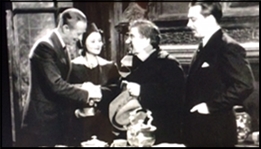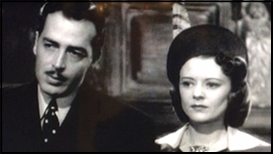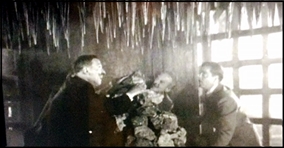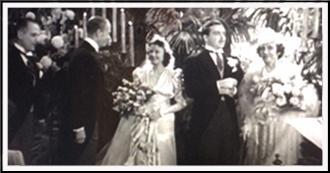Sat 20 Mar 2021
A Mystery Movie Review: BULLDOG DRUMMOND’S SECRET POLICE (1939).
Posted by Steve under Mystery movies , Reviews[9] Comments

BULLDOG DRUMMOND’S SECRET POLICE. (1939) John Howard (Captain Hugh C. “Bulldog” Drummond), Heather Angel (Phyllis Clavering), H. B. Warner, Reginald Denny, E. E. Clive, Elizabeth Patterson, Leo G. Carroll. Screenplay by Garnett Weston, based on the book Temple Tower by Herman C. McNeile. Director: James P. Hogan. Currently available online at several sites, including YouTube and Amazon Prime.
John Howard played man of adventure Bulldog Drummond seven times in the movies, this one being the sixth, and it was Heather Angel who played his girl friend and would-be bride Phyllis Clavering in the last four of them. (If I’m off on the count of either of these, please let me know.) This one begins with high hopes that their marriage would finally come off, but even Aunt Blanche knows that something is going to happen and that the two of them are going to be off on yet another venture.

But this one starts and actually takes place for the full film at Temple Tower, Drummond’s ancestral mansion of a home, with the ring, the best men, and the minister all ready and waiting. What they don’t know is that the next visitor through the front door will be a dotty old professor of history who claims that he has a book with a code in it that will guide them all to a treasure well hidden somewhere in the house.
And where there’s a treasure, there’s a villain who has learned about it too, and who is all too willing to kill whoever gets in his way to get his way to get his own hands on it.

Lots of fun and adventure ensues, what with hidden passages, underground rooms, including one booby-trapped with iron spikes in the ceiling that comes crushing down upon whoever is inside when someone outside the room pulls a certain lever.
Lots of fun, as I say, but unfortunately the fun is awfully silly way way too often, starting with the dotty professor and continuing with the clumsy antics of Drummond’s faithful crew and Aunt Blanche’s continual warnings and fainting spells.
I hope I’m not giving too much away by saying that [WARNING] Phyllis does not get her man this time around, but while I haven’t watched Bulldog Drummond’s Bride, the next in the series, I have my fingers crossed that she will then, given one last chance.

March 20th, 2021 at 9:42 pm
An earlier version of Temple Tower with Kenneth McKenna appeared shortly after the 1929 Ronald Colman Bulldog Drummong film, somewhat more faithful to the book, though by all accounts somewhat rushed onto the screen.
Ironically TEMPLE TOWER is one of McNeile’s better books with much less of the silly blathering and sometimes racist and jingoistic asides of the early books. It’s the one where Drummond wakes up in bed with a very nasty spider, likely the inspiration for the centipede that nearly does James Bond in in DOCTOR NO.
Drummond and friend Peter Darrell are on holiday in France (one of the few Drummond’s not set in England) and encounter a master criminal and thief Le Bossu (ironically the nom de plume of Paul Feval’s famous swashbuckler hero and popular novel and play), who is pretty much the best of Drummond’s bad guys other than Carl and Irma Peterson. There is a treasure, the tower in the title, and a really deadly cat and mouse game between Drummond and the well matched Le Bossu in the dark.
All the Howard Drummond’s, like the Colman BD STRIKE BACK that inspired them, are borderline silly in todays terms, but they move fast, have attractive casts, and some of the best villains in the movie business including J. Carroll Naish, Leo G. Carroll, George Zucco, and Anthony Quinn along with Howard, Denny, Angel, Clive, Warner and Barrymore, John Sutton, and Pattinson as Phyllis aunt.
None of them quite stand out, but overall they are one of the most consistently entertaining film series of the era mostly directed with energy by Hogan and with screenplays by the likes of Stuart Palmer.
March 20th, 2021 at 11:39 pm
I had never watched this one before, and I have yet to see the next. The earlier ones, if seen, it hasn’t been since I was in junior high. This one was well made, and I enjoyed it, but it really took me by surprise how comedic it was. As the one example I used, if you want to know exactly what the definition of dotty is, watch this movie.
March 20th, 2021 at 10:35 pm
In certain types of our most beloved old movies, practically any university professor character will sprout a handlebar mustache and a shaggy, ungroomed, unruly mop of tangled hair
March 20th, 2021 at 11:35 pm
Whereas in real life … well, take me for example.
March 21st, 2021 at 9:59 pm
I want to like the Paramount DRUMMONDs more than I do. They’re certainly well-produced but the slant toward light comedy and the ongoing Marriage gag mar them for me.
March 21st, 2021 at 10:36 pm
I do wonder why they thought they had to play up the humor so much. Watching this one today (well, last week), it certainly didn’t help.
March 22nd, 2021 at 5:51 pm
BULLDOG DRUMMOND STRIKES BACK had been a huge hit as primarily a comedy mystery with Colman frequently coming close to breaking the fourth wall making asides meant for the audience (Colman’s ability to deliver lines that would be howlers in anyone else hands was one reason the film worked), and Charles Butterworth and Ona Munson strong comedy relief. It was the model for not only many of the comedy mystery films that followed in terms of sophistication and wit (including the Thin Man) but for the entire Drummond series at Paramount.
Dating back to 1929’s BULLDOG DRUMMOND with Colman the comedy element had been strong and the melodrama played tongue in cheek much like the repartee in THE PRISONER OF ZENDA (the model for McNeile’s books being the Scarlet Pimpernel which itself depends on bright young things blathering and delivering tongue in cheek lines).
That wasn’t too much off the books which often featured bright young things wise cracking, with Drummond’s ‘wit’ in THIRD ROUND driving Carl Peterson into such a state he throws up followed by Drummond asking “Is Carl feeling icky poo?” (hard to imagine James Bond asking that of Blofield or Goldfinger).
Comedy relief often threatened to crowd out the other elements in most B movie series (a wag famously commented of the Falcon films a little mystery relief would be welcome) supplied by the likes of Keye Luke (Charlie Chan), Mantan Moreland (Chan), Reginald Denny (Drummond), E. E. Clive (Drummond), Eric Blore (the Lone Wolf), David Burns (the Saint), Tom Kennedy (Torchy Blaine), Cliff Clark (the Falcon), Donald Meek (Nick Carter), George E. Stone (Boston Blackie), Robert Coote, Nat Pendleton, and others (Mr. Moto) and sometimes the stars like Lloyd Nolan’s Michael Shayne, and in the case of Drummond was true to the books with the character of Algy Longworth who is just as clueless in the books as the films.
It’s hard to see it today, but when they were written the Drummond books were aimed at younger audiences in the Post War period, Drummond himself and his crew bright young men (in a generation where the War meant bright young men were rare) and women who were the height of modernity drinking cocktails and quaffing beer, laughing and blathering in the manner of P. G. Wodehouse or early Albert Campion (almost a parody of Drummond in the first few books), and cracking wise at death and danger. They seem old hat today precisely because they were so modern then. Nothing dates so fast as yesterday’s modernity.
March 22nd, 2021 at 6:07 pm
David, You are quite right, of course, and I am sorry my reply is so much shorter than what you have reminded me of. Comedy always was a part of so so many detective movies in the 30s. You have named them all. I think, though, there there is some mark above which BDSP crossed that makes it so over the top for me. I used the word “silly” and I think it’s a good one to describe it. It is a lot of fun to watch, but it really did take me by surprise to find that it more a comedy than the mystery-adventure movies I somehow remembered of the earlier ones in the series.
March 25th, 2021 at 7:02 pm
I forget where I came across this (maybe Robert Graves’ ‘The Long Weekend’) but I learned somewhere that Britain in the 1930s and the 1950s were both pinnacles in fields like literary criticism, publishing, newspapers, and editing. It apparently stemmed from English upperclassmen (officers) making it through each war better than ordinary ‘tommies’, and –being extremely well-read, and also at-a-loss for a genteel occupation –went into journalism. Specifically, literary reviewing. Both post-war periods are renowned for the erudition found in the everyday literary sections of popular newspapers.